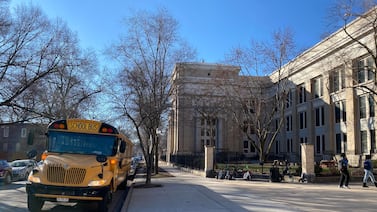Colorado’s 2024-25 budget proposal cleared the Senate on Friday morning, giving the bill approval from both chambers and paving the way toward sizable investments in K-12 and higher education next year.
The bill includes money to help districts with an influx of migrants, more money for special education, and tuition increases that fall below inflation.
The Senate approval of the $40.6 billion budget bill ends two weeks of debate in the upper and lower chambers to add amendments to the proposal. During the final stretch to approve what’s known as the long bill, the powerful Joint Budget Committee will consider amendments and then send the bill to Gov. Jared Polis who has the ability to veto line items within the budget before his signature.
For lawmakers from both aisles, the big win for the year will be the long-anticipated end to the so-called budget stabilization factor, or a process of withholding required funding to K-12 education spending to use elsewhere. Since 2009, the process has held back over $10 billion from schools.
Joint Budget Committee Vice Chair Sen. Rachel Zenzinger, an Arvada Democrat, said it’s a joyous moment for her to say lawmakers are fully funding schools. The budget and the school finance act are the only two bills lawmakers must pass before they adjourn in May.
“Of all the budgets that I have proudly helped to craft over the years, this one will stand out in my memory years from now,” Zenzinger said. “I am pleased to see that we have reached this milestone in the process.”
Here’s what else is included within the 2024-25 budget proposal for early childhood, K-12, and higher education:
- More money for K-12 education — The long bill provides over half a billion more in funding for K-12 education statewide, bringing total program spending to about $9.7 billion next year.
- Relief for districts helping newcomer students — An influx of migrant students have come to Colorado and districts have needed more resources to help them. In the budget, Colorado will spend $24 million to backfill some money spent by districts addressing the needs of those students.
- The state meets its special education funding obligation — Colorado lawmakers have chipped away at increasing statewide special education funding for years. Next year, lawmakers want to spend $34.7 million more on special education, bringing total funding up to $375.6 million and meeting what’s required by the state.
- More money for at-risk students — While the state’s school finance bill will delay a new method to calculate at-risk students, the long bill does add another $1.6 million for those students who are more likely not to graduate from high school.
- Big budget increase for higher education institutions — Colorado universities worried initial budget numbers wouldn’t take into account inflation and a need to pay workers more. The budget doesn’t provide the entirety of what they asked for, but increases spending by $134.9 million, or about 10%, bringing total spending on college and university budgets and student financial aid to $1.6 billion next year.
- Tuition increases stay below inflation — The money for colleges means less of a need to increase tuition. Colleges and universities will be allowed to raise tuition by 3% for in-state and 4% for nonresident undergraduate students.
- More state money for UPK — Colorado will spend $53.8 million more next year on its universal preschool program next year, but overall spending will drop mostly due to the end of federal stimulus money. The early childhood department will spend $769 million, down from $808.9 million this year.
- Budget prepares for the end of federal pandemic relief funds — Federal money sent to states to provide aid during the pandemic will expire in September. The budget prepares the state for the loss of that funding, including within K-12 education.
Jason Gonzales is a reporter covering higher education and the Colorado legislature. Chalkbeat Colorado partners with Open Campus on higher education coverage. Contact Jason at jgonzales@chalkbeat.org.








